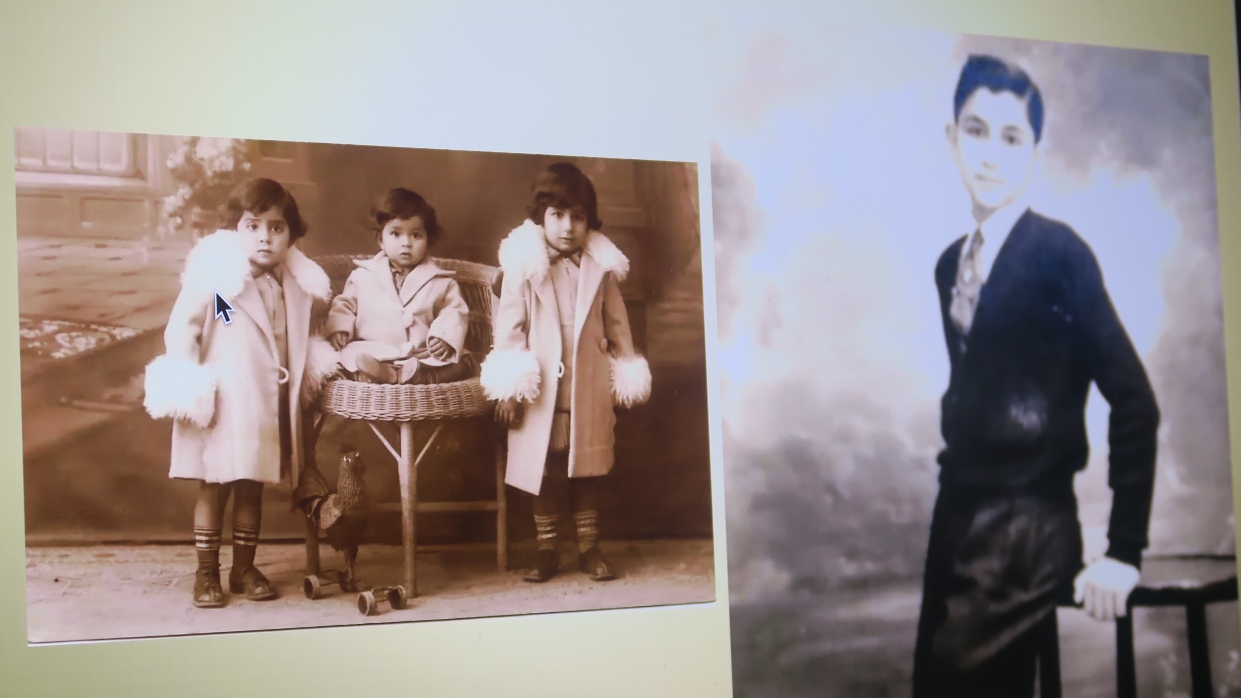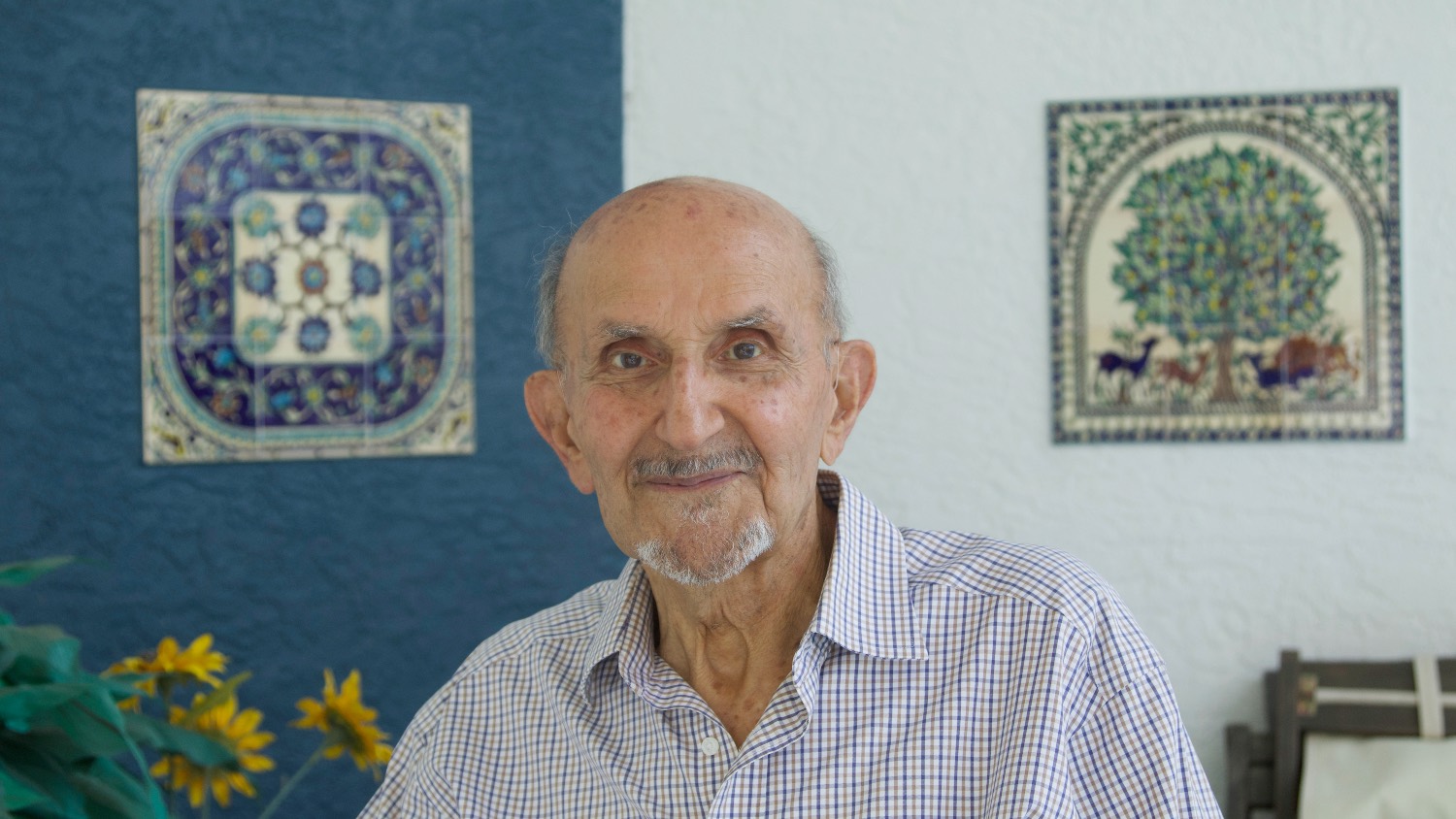Hasan Hammami was just 15 when Zionist militias rampaged through historical Palestine in 1948, destroying hundreds of villages and cities to make way for the creation of IsraelFlorida resident Hasan Hammami vividly recalls growing up in Jaffa – once a thriving Palestinian industrial and cultural hub known as the “bride of the sea”.
He remembers the sights, the sounds and the tastes. But, more importantly, he also remembers the trauma.
When pressed about his teenage years, he pauses, sometimes drifting into the distance.
It’s not because he can’t recall the finer details, he says, but because he wants to detail his family’s displacement at the hands of Zionist militias.
The memory of Israel’s invasion of Palestine is a recurring nightmare for the 90-year-old.
Speaking to Middle East Eye from his home in Punta Gorda, Florida, Hammami had an iridescent smile on his face when talking about how thankful he is for the long life he’s lived.
He’s travelled to more than 20 countries, had two long and fulfilling marriages, and climbed up the corporate ladder at the multi-billion dollar firm Procter & Gamble.
But something’s greatly amiss, he says.
He would trade it all, the money, the sandy Florida beaches, everything he has for a normal childhood and for the Nakba to never have happened.
“Today, if I had the opportunity to go back and live in Jaffa as a free man, in a society where everyone is equal… I would go right now,” he told MEE.
For Jews who moved to the new state of Israel in 1948 to escape antisemitic persecution, it was a hopeful time. Some had fled the horrors of the Holocaust and dreamed of establishing a nation-state that could be safe for the Jewish people.
But for Palestinians like Hammami, it marked the start of a 75-year life in exile and a long struggle for statehood. They view the Nakba as an enduring trauma, as Palestinians continue to face displacement from their homes today.
Hammami was just 15 years old at the time of the Nakba, when hundreds of thousands of Palestinians were forced out of their homes by Zionist militias to make way for the creation of the state of Israel in 1948.
“There are 25 or 30 very specific incidents around the Nakba which touched my life personally,” he said.
The most devastating was not being able to have a normal family relationship with his brothers and sisters, as well as his nieces, nephews and grandchildren.
A fond childhood in Jaffa
Sitting in his dining room, Hammami laments the fact that his extended family is scattered in different corners of the world, and was eager to share his story.
“My childhood was lovely, I lived in a community where we [people of different faiths and backgrounds] played together, we even went to the same school,” he said.
“Our home was less than a kilometre from the beach. When we went to the beach, there was a small cafe in the spring and summer,” he said. “We would [go for] a swim, shower and have breakfast and then go to school.”
Hammami learned to swim at the age of five, a hobby he says he continues to pursue to this day. And just like his home in Jaffa, his residence in Florida is also less than a kilometre from the ocean.
He recalled the first bicycle he was gifted after the end of World War II. The journeys he would make to school or his friends’ homes.
Looking back, he also remembers the early signs of trouble his community faced.
During one bike ride, he ventured south and encountered the settler outpost of Holon, which has grown to now serve as Israel’s second-largest industrial zone.
“At one point, I discovered this colony called Holon, which was supposed to be an agricultural colony that was only a few kilometres southeast of Jaffa. But it didn’t have a single green blade of grass or single bush,” he said.
“Essentially, [it was] an aggressive [Jewish] colony. Part of the Zionist plan was to surround Jaffa, which had Christians, Muslims and Jews. They didn’t care. They just wanted it all for themselves.”
Today, between 600,000 and 750,000 Israelis live in such settlements, equivalent to roughly 11 percent of the total Jewish-Israeli population.
Hammami said it wasn’t long before he witnessed firsthand the extent of the violence.
The disaster
Prior to the creation of the state of Israel, Palestinians lived under British occupation. It was during this period, which lasted between 1920 and 1948, that Hammami spent his childhood.
By the mid-1940s, the situation in Jaffa and across Palestine was getting worse. As the British were preparing to end the occupation and leave the country, Zionist militias intensified their attacks against Palestinian towns and villages.
‘So anyone who says there were no civilised people, there was nobody there. We were. We were there’
– Hasan Hammami
By the time the Hammami family decided it was time to leave, they had already heard of dozens of massacres.
“A few days before we left there were a series of attacks, not just against Jaffa, but [also aimed at] attacking every strategic city and town and village near Jaffa,” he said.
The most famous of these was the Deir Yassin massacre on 9 April 1948, in which Zionist forces killed more than 100 Palestinians including women and children, despite having agreed to pause the fighting.
“It was a peaceful town and they made a deal with their neighbours, with the Israelis, that they won’t attack and they wouldn’t be attacked,” Hammami said, referring to Deir Yassin which was located in between Jaffa and Jerusalem.
“However, the Israeli gangs decided they wanted to take care of Deir Yassin and they wanted to make it an example.
“They attacked Deir Yassin from all three different sides, and they committed a terrible, terrible massacre.”
Later that month, Hammami’s father decided it was time to escape while they still could.
He booked tickets on a passenger boat for Lebanon, but when it arrived, Jewish settlers began throwing projectiles, forcing the ship to move farther out to the sea rather than dock near the shore.
“There must have been over 10,000 people trying to get out of Jaffa port,” he said.
Confronted with the choice of either travelling by road and facing attack, or leaving by cargo ship, they chose the latter – gathering all their belongings – carpets, jewellery and some £2,000 in cash.
“When we finally made it to this cargo sailing boat which was anchored approximately half a kilometre outside of the port of Jaffa, we were like sardines … we were all sitting shoulder to shoulder. Anyone who stood up couldn’t get back down, there were over 3,000 people on that boat,” he said.
The trip, which should have lasted 12 hours, ended up taking three days. Within just the first few hours, they ran out of clean drinking water.
“The following day, a pregnant woman less than probably four metres away from me lost her baby.
“No kid should be put in a situation where he feels completely defenceless.”
Finally, after three days on the sea, they landed in the Lebanese town of Tyre, where they started their new lives as refugees. Initially, the family thought they would only be there temporarily and they would return to Jaffa, but after the state of Israel was created, Jaffa was gradually annexed and became the city of Tel Aviv.
“It was a disaster. My wonderful childhood was gone. We became refugees.”
As the world watched with little action, the land the Palestinians called home continued to shrink with more settlements being built in the occupied Palestinian territories each year.
“The message had not sunk in yet, because everybody believed this isn’t happening, we should surely be back within four to six, maximum eight weeks. The world will not allow this kind of crime to take place.”
Hammami went on to work in Saudi Arabia, where he got a job as a translator for the oil company Aramco. Later, he went to study in the UK, where he met his first wife Barbara.
He worked his way into the United States, where he obtained a job at the American multinational company Procter & Gamble and eventually received US citizenship.
His children now live across the world, with his eldest daughter in France, another daughter living in occupied Palestine, and his youngest daughter living in Connecticut.
His eight siblings are also scattered throughout the world, with several living in different US states, one living in Jordan, and some in the Gulf region.
‘We were there’
Even at the age of 90, he lives an active life. He spends his time reading, writing, speaking at events and helping to organise and advocate for Palestine in southern Florida.
And each day, he makes sure to get 45 minutes of aerobic exercise in his swimming pool.
His home on the western coast of Florida is filled with mementos from his world travels, with sculptures from West Africa to French paintings and Palestinian tiles.
The interior walls of his living room are lined with maps of Palestine, and his shelves filled with books chronicling the history of his homeland.
One of his post-retirement goals has been to collect as many books as he can about Palestine. He then gifts them to his friends and acquaintances so that they may too know his people’s history.
Dozens of files and file folders fill up the screen of his desktop computer, where he meticulously stores historical documents he has come across over the years.
When discussing his own displacement, Hammami oscillates between an assertive optimism and determination, and grief.
His days are spent in pursuit of preserving Palestine’s history, and making sure his story and the story of all those who suffered are heard by anyone willing to listen.
“My home phone number in Jaffa is 1109. It’s in the telephone directory of Jaffa and it’s on my computer. So anyone who says there were no civilised people, there was nobody there. We were. We were there.”
Post Disclaimer
Disclaimer: Nakba at 75: This Palestinian survivor would trade anything to return home - Views expressed by writers in this section are their own and do not necessarily reflect Latheefarook.com point-of-view




